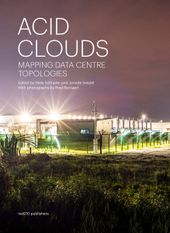
Acid Clouds: Mapping Data Centre Topologies
How can we rethink the ownership and control of data? And in what ways do data centres influence our identities and societal norms? In this book launch we will discuss the themes addressed in ‘Acid Clouds’, which examines data centres through different lenses, from artifical intelligence to machine learning and from environmental impact to digital capitalism. How can we critically engage with the hidden yet pervasive infrastructures that shape our world?
Acid Clouds: Mapping Data Centre Topologies explores the hidden infrastructures of our digital lives, exposing the political, ecological, and social dynamics embodied by data centres. Moving beyond the sanitized image of the “cloud,” it unpacks the material and ethical complexities of these often-overlooked data storage structures. During this event we will dive deeper into the themes explored in the publication. Editors Niels Schrader and Jorinde Seijdel will tell you more about the background and context of Acid Clouds: what do the different lenses, essays and nighttime photography tell us about the infrastructures and consequences of data centres? Afterwards media theorist Geert Lovink and Archival and Information expert Annet Dekker will talk about the data centre topologies from their own specialisations. Together, these perspectives illuminate the power structures, environmental effects, and cultural implications of data centres.
With support from: Fonds 21, BPD Cultuurfonds, J.E. Jurriaanse Stichting
About the speakers
Niels Schrader is a concept-driven information designer with a fascination for numbers and data. He is founder of the Amsterdam-based design studio Mind Design and member of the AGI – Alliance Graphique Internationale. Next to his design practice Schrader writes regularly for Grafikmagazin and Open! Platform for Art, Culture & the Public Domain. In his role as an educator Schrader focusses on social, political and environmental processes driven and influenced by digital technologies. In this context, he has initiated a number of large-scale research projects with partners from outside the academic environment. These institutions include governmental and non-governmental organizations like the Dutch Parliament, National Archives, Free Press Unlimited, Greenpeace, Hivos and Amnesty International.
Jorinde Seijdel is an independent writer, editor and lecturer on subjects concerning art and media in our changing society and the public sphere. She is also editor-in-chief of Open! Platform for Art, Culture & the Public Domain. Her articles have appeared in various magazines and publications, including Spaces for Criticism: Shifts in Contemporary Art Discourses (Valiz, 2015). She was co-editor of the publication What’s the Use? Constellations of Art, History and Knowledge (Valiz, 2016). She is theory mentor at the Gerrit Rietveld Academie, Amsterdam and Head of Programme of Studium Generale Rietveld Academie.
Roel Backaert began his photography studies at Studenteninformatiesysteem Antwerpen (SisA) in Antwerp, and also studied at the Sint-Lukas Academie in Brussels. He lives and works in Amsterdam where he graduated from the Gerrit Rietveld Academie in 2004. Since then he has been travelling the world as an architectural photographer and pursued a career as an autonomous artist. The main focus in his work is the urban landscape from which he often plucks a peculiar object, building or cityscape out of its context to present it in compelling centralized compositions. Backaert works mostly at night with a 4 × 5 inch (10.2 × 12.7 cm) analogue camera using very long shutter-speeds that pull the subjects out of the darkness into an exceptionally colourful twilight.
Geert Lovink is a Dutch media theorist, internet critic, activist and author of multiple books, most recently Sad by Design (2019), Stuck on the Platform (2022) and Extinction Internet (2022). After his Ph.D and postdoc he founded the Institute of Network Cultures (www.networkcultures.org) at Amsterdam University of Applied Sciences (HvA). In 2021 he was appointed art history professor at the University of Amsterdam. His INC centre organizes conferences, publications and research networks. Recent projects deal with digital publishing experiments, critical meme research, participatory hybrid events and precarity in the arts.
Annet Dekker is Assistant Professor, Cultural Analysis, and Archival and Information Studies at the University of Amsterdam. She is also Visiting Professor and Co-director of the Centre for the Study of the Networked Image at London South Bank University. Dekker publishes regularly in numerous collections and journals and is the editor of several volumes, most recently, Documentation as Art: Expanded Digital Practices (Routledge, 2022, with Gabriella Giannachi) and Curating Digital Art: From Presenting and Collecting Digital Art to Networked Co-Curating (Valiz, 2021). Her monograph, Collecting and Conserving Net Art (Routledge, 2018) is a seminal work in the field of digital art conservation.
The book presentation at Spui25 is generously supported by the Institute of Network Cultures and the Amsterdam University of Applied Sciences.

:rgb(-15)

:rgb(-25)

:rgb(8)
